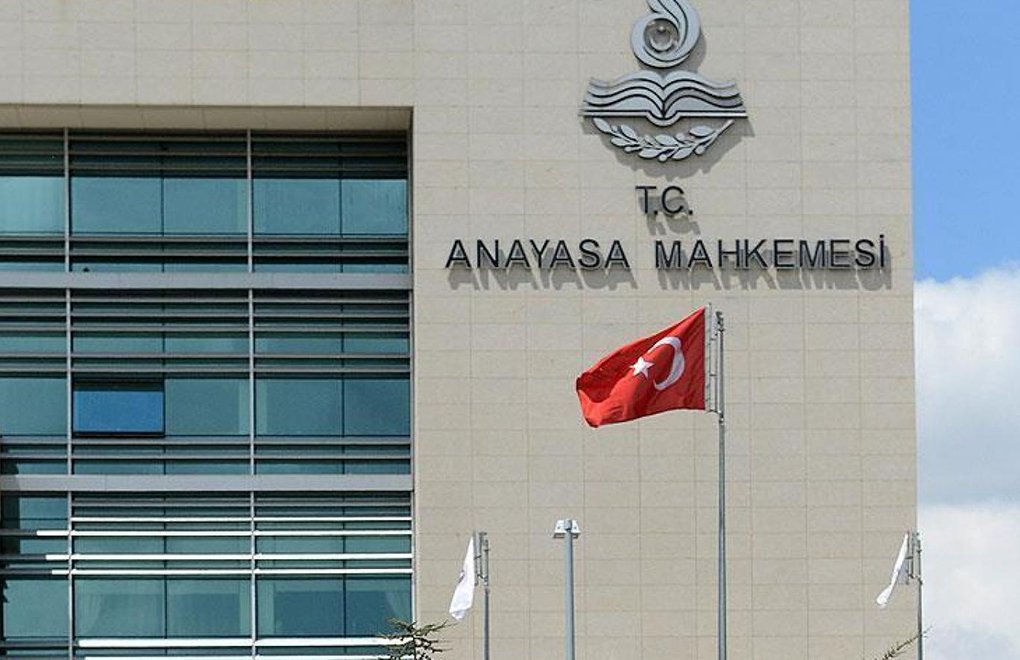Photo: AA
Click to read the article in Turkish
Members of a political party were subjected to "treatment incompatible with human dignity" after hanging a banner against the ruling Justice and Development Party (AKP) that read, "Thief, Murderer AKP," the Constitutional Court has ruled.
Ahead of the local elections in 2014, the Freedom and Solidarity Party (ÖDP) hung the banner on its building in Edirne, on the day Recep Tayyip Erdoğan, who was the prime minister at the time, held a rally in the city.
Upon an order by a public prosecutor, the police attempted to enter the building to remove the banner. After the party members refused to open the doors, the police stormed the building and detained them using violence.
.jpg)
Fourteen members of the ÖDP filed a complaint against the police officers who used violence but the Public Prosecutor's Office decided not to prosecute them. The Penal Court of Peace refused an appeal by the ÖDP members.
The party members then took the case to the Constitutional Court, which ruled that "prohibition of treatment incompatible with human dignity" guaranteed under Article 17 of the Constitution and "freedom of expression" guaranteed under Article 26 were violated.
The court's decision dated February 6 was published in the Official Gazette today (March 26).
Treatment incompatible with human dignity
The reasoned decision said, "The ruling party's obligation to bear criticism is very broad. No matter how heavy the views and thoughts criticizing the policies of the ruling party, no sanctions should be imposed on people because of them."
In terms of the prohibition of treatment incompatible with human dignity, the decision said, "The physical power used by law enforcement officers to catch a person who is wanted to be caught but who resists must be limited to a level sufficient to break this person's resistance. The applied force must in no way go beyond the purpose of breaking the resistance and tend towards tormenting the resisting person."
Article 17Everyone has the right to life and the right to protect and improve his/her The corporeal integrity of the individual shall not be violated except under medical No one shall be subjected to torture or maltreatment; no one shall be subjected to |
"The Agile Force used pepper gas directly against the applicants, who were in a room in the building. Gas was sprayed in an indoor area where it was not possible to escape from the effects of the gas, it was not assessed whether it was possible to use alternative instruments. It has not been considered acceptable to directly intervene with gas in a closed area in terms of proportionality of the force used."
The court concluded that the use of force was not proportionate, the applicants were humiliated and the prohibition of treatment incompatible with human dignity was violated.
"The Chief Public Prosecutor's Office reached a conclusion regarding the complaint without conducting an examination regarding the scene of the incident, examining the use of gas in a closed space, and taking statements from law enforcement officers involved," the decision stated, adding that it was incompatible with Article 17 of the Constitution.
There was not an effective criminal investigation and the prohibition of treatment incompatible with human dignity was violated on procedural grounds, the decision further said.
Freedom of expression
The top court said that the banner, which was the primary cause of the incidents, included two expressions that would be considered a value judgment. One of them, "thief," implied that the ruling party involved in corruption, and the other, "murderer," reflected the "dissatisfaction about the security policies in the fight against the PKK [Kurdistan Workers' Party] terrorist organization."
To voice discomfort about economical mechanisms and claims about rent-seeking and corruption and to demand transparency is only possible in democratic regimes where thoughts can be expressed without facing obstacles, according to the judgment.
"Freedom of expression applies not only to information and ideas accepted by society but also to hurtful, shocking or worrying information and thoughts.
Article 26Everyone has the right to express and disseminate his/her thoughts and opinions by speech, in writing or in pictures or through other media, individually or collectively. This freedom includes the liberty of receiving or imparting information or ideas without interference by official authorities. This provision shall not preclude subjecting transmission by radio, television, cinema, or similar means to a system of licensing. |
"Due to its indispensable importance in contemporary democracies, patience and tolerance should be shown to efforts to express and spread thoughts that do not pose a threat to public order and do not encourage violence."
The Public Prosecutor's Office and the first instance court, which ordered the confiscation of the banner, were not able to show that the banner was provocative, caused the escalation of the conflict and posed a risk for the public order, the court stated.
"The ruling party's obligation to bear criticism is very broad. No matter how heavy the views and thoughts criticizing the policies of the ruling party, no sanctions should be imposed on people because of them.
"It has been concluded that the interference with freedom of expression did not meet a necessary social need, was not proportionate, and consequently, did not comply with the requirements of the democratic social order." (HA/VK)







